For Candidates Interested
in September 2022 Start
Fall Early Application Deadline – March 28, 2022
Fall Final Application Deadline – May 16, 2022
UVA’s Darden School of Business has received top overall ranking from Bloomberg Businessweek in teaching.
The publication surveyed more than 10,000 Class of 2018 business students from 126 different schools. Darden achieved a perfect score of 100 based upon the survey prompt ‘My Instructors Were Inspiring and Supportive.’ Both The Economist and The Princeton Review have given Darden top ratings, the former for “Which MBA 2018?” and the latter for “Best Professors.”
In Bloomberg‘s survey, Darden also made the top ten in two categories: “My Education Inspired Me to Pursue an Ethical Career” (7th) and “Courses Were Taught By the Right Mixture of Academics and Business Professionals” (9th). You can read here for more on UVA Darden’s top rankings.
NYU Stern’s Executive Education division will host consulting firm SRW & Co for The Association of Southeast Asian Nations’ (ASEAN) Global Leadership Program from April 13 – 17, 2020.
The program came to Stern last year for the first time since its inception in 2009. Since then, it has been held at leading business schools across the U.K, China, and the U.S. This year, the program will be based around four themes: Globalization; Analytics; Leadership; and Innovation. Attendees will be executives from both the public and private sectors in a wide cross section of industries.
Raghu Sundaram, Dean of NYU Stern, says of the event, “The Stern School has a rich legacy of transformation, harnessing the dreams and energy of New York City and the world beyond, to open new horizons, create new networks and spark new ideas. We look forward to a week full of thoughtful discussion and a lively exchange of ideas with the participants and our faculty … we’re delighted to host this group of esteemed senior executives from South East Asia in April 2020”
Attendees to the program will participate in a combination of experiential learning modules, team building exercises, and discussions with leading Stern faculty. Read here for more on the ASEAN, SRW & Co., and the upcoming conference.
Effective July 1, 2019, five members of Penn State Smeal College of Business‘ faculty received promotions for the current academic year.
Jess Cornaggia, Ph.D. specializes in corporate finance, financial intermediation, credit ratings, and household finance. She has been promoted to Professor in the Department of Finance. Srikanth Paruchuri, Ph.D. will be promoted to professor in the Department of Management and Organization. Parachuri’s work focuses on the evolution of entrepreneurial ideas and innovation, along with the research and development of new technologies.

Smeal announced its newest internal teaching promotions, with many notable faculty members earning a much-deserved title boost.
Matthew Gustafson, Ph.D. has received tenure, along with a promotion to associate professor in the Department of Finance. His research focuses upon personal finance, regulatory issues in finance, and capital raising. Anh Le, Ph.D., who is an expert in the area of fixed income, also received tenure and a promotion to Associate Professor in Finance.
Zhongyi Yuan, Ph.D. was promoted to associate professor in the Department of Risk Management, and he also received tenure. His research specialties are rare event simulation, catastrophe risk modeling, extreme value theory, and insurance-linked securities. For further information on the new faculty, read here.
UCLA Anderson celebrated 2019 Commencement last month to celebrate the full-time, fully-employed, and Executive MBA classes, along with those completing their doctoral degrees.
Interim Dean Al Osborne, along with several other speakers, challenged the students to create social impact and to work to affect change where it is needed.
“If you listen and you work, I think there’s a chance for good to overcome evil. I want you to be the best versions of yourselves over time, become powerful [and] courageous. Use your voice—your identity, presence—and the courage to speak truth to power. If there were ever a time people needed to have voice, it is now.”
Bernard J. Tyson, Chairman and CEO of Kaiser Permanente, gave the keynote address, in which he encouraged the graduates to act as agents of change.
“I say to you today, never are the opportunities greater than right now for you, individually and collectively, to follow through on the promises you’ve made to all who are counting on you, whether they know it or not,” he said. As he has exhibited through his tenure at Kaiser, Tyson conveyed the sense that success must not only benefit individuals and organizations, but communities and families as well.
You can read here for more excerpts from the 2019 Commencement speeches.
New research from professors of management at the University of Delaware Lerner College of Business and Economics has revealed important conclusions about the nature of negotiation.
John Sawyer and Dustin Sleesman’s article, “The power of phantom alternatives in negotiation: How what could be haunts what is,” which was co-authored by researchers from Southern Methodist University, was recently published in the journal Organizational Behavior and Human Decision Processes.
The study’s focus was the influence of ‘certain’ versus ‘phantom’ alternative to a negotiated agreement, and how each side in a negotiation behaves in the event of such alternatives. The example of a job seeker was used to illustrate the point. After interviews with two different companies (‘Companies A and B’), the job seeker receives an offer from Company A. Though Company B has not yet offered a position, the seeker behaves as though they have. The power of this ‘phantom’ alternative on a larger organizational scale was the subject of the study.
Sleesman explains:
“I teach this idea when it comes to approaching questions that you may be asked during a negotiation. Your counterpart may try to discern how much power you have by asking if you have a good alternative to their offer. As soon as you say, ‘I don’t have any other offers,’ you give away power. By stating that you might be receiving an alternative in the near future, you both answer honestly and preserve negotiating power.”
For more on the team’s research, read here.
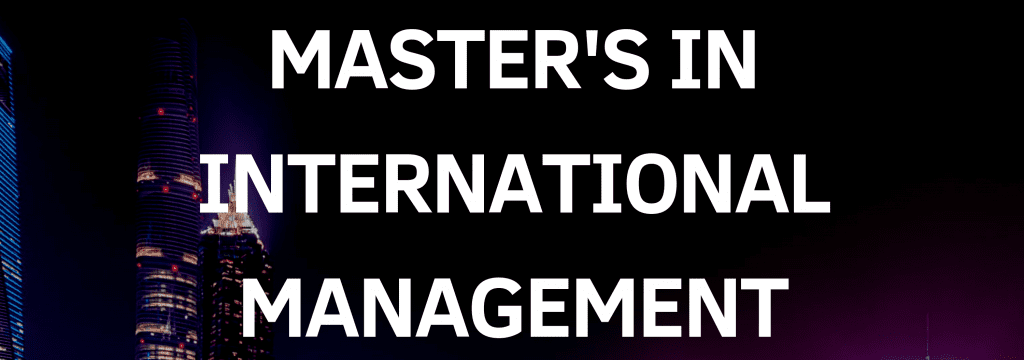
Welcome to MetroMBA's Master's in International Management Guide. As the world's best business schools continue to evolve, traditional MBA programs are being replaced or supplemented with specialized master’s degrees. For many schools, that means including a Master's in International Management program to provide graduate training for those seeking to develop careers in a global economy.
Scroll down to find some of the world's best Master's in International Management degrees offered by the world's leading business schools: a list that continues to grow year by year. But first, what is a Master's in International Management, what does it take to graduate, and what career opportunities are available after graduation?
A Master’s in International Management (MIB) degree combines international business, international political economy, and the learning of languages and world cultures. It’s designed for business professionals seeking to establish or accelerate their career in international business and the global economy.
The degree focuses on international operations, offering an in-depth understanding of strategic planning and organizational capabilities required for global business. It includes specialized learning in areas such as international marketing, finance, and human resource management. It also addresses topics such as imports and exports, intercultural communication, and multinational corporations.
The end goal of an MIB degree is to broaden students’ cultural awareness as well as their professional life. Students should walk away from the degree with a better understanding of different traditions and practices along with the ability to adapt to new locations and ideas.
Students who choose a Master's in International Management degree will take advanced business courses that help them adopt a global perspective. Those courses are accompanied by studies in economics as well as specific studies in the governments of other countries. The goal of the coursework is to teach students how to operate in multi-cultural situations and environments.
Another essential aspect of the curriculum are foreign language skills. In many programs, students are required to complete a study abroad component to help increase their appreciation for other cultures.
Typical classes include:
Most business school also encourage internships or a capstone project where students participate in real-world challenges. The goal is to give students hands-on, practical knowledge in their given career choice. Beyond that, depending on the program, you may have the option to customize your coursework to a more specific area of finance. For example, you could take courses in:
Most Master’s in International Management programs tend to be one year in length, though many others require a full two years for graduation. Programs can be full-time or part-time, residential or online, it all depends on the exact program you choose. However, most of the top programs are full time, requiring students to take courses in different countries and cultures.
Admissions into an MIB program can vary based on the business school, but typically requires a high level of excellence in grades, test scores, professional experience, and communication. Applications may consist of:
At minimum, applicants are expected to have at least two years of work experience under their belts, preferably international with strong leadership experience. Students also have to be willing to study abroad on multiple campuses and in a multicultural class with many different nationalities and a broad range of professional backgrounds.
Tuition varies greatly among top business schools. It ranges from $50,000 to $100,000 USD for a year plus living expenses. This cost does not include expenses for study abroad programs. In many cases, funding is available for MIB students in the form of scholarships, fellowships, employer sponsorship, and teaching assistantships. There are also loans and external financial support sources available.
Graduates of a Master’s in International Management are equipped for careers in global business. They should have sufficient skills to be leaders in a variety of environments and in a range of situations where they would be critical to the decision-making process. Career opportunities are diverse and plentiful, and typically include large corporations where global operations take place.
Most often, graduates will work for a business that either has offices in multiple countries or markets their products abroad. Graduates tend to take leadership positions in these companies, displaying their skill in the competitive international labor market. Popular industries include consulting, technology, consumer goods, financial services, and health/pharma.
MIB graduates are highly sought-after employees. Potential job options include:
The salaries for a Master’s in International Management graduate varies depending on the final career field. According to Payscale, the average salary is $81,000. However, the highest paid earn $139,000 while some of the lowest paid earn $74,000. Here’s how that breaks down:





 Loading Programs
Loading Programs
If you’re a natural problem solver who likes tackling large projects and managing teams, a role as an Implementation Consultant (IC), could be the perfect fit. With jobs in fields as varied as compliance, human resources, software development, healthcare and pharmaceuticals (among others) this is a top job for MBAs who want to put their management skills to work.


Companies like Oracle, Deloitte, IBM, PwC and McKinsey all frequently seek ICs to serve in various capacities, which is great news for MBAs who are just starting out or considering a career shift.
In short, an IC is hired by an organization to ensure that a new system, tool, or process is used efficiently. According to an article describing the position on modernanalyst.com, “You [will be] chiefly responsible for understanding the client’s requirements and … addressing gaps so that the solution or product will meet your particular client’s needs.”
An IC is hired by a service provider (such as a tech company or a finance and consulting firm) to put the service into place and ensure that it runs as smoothly as possible. Often, the IC is brought in on a project by project basis so a fair amount of flexibility is required in the role. Also important are communication and “people skills,” as the IC will work with teams in various levels and divisions within a company.
A story on LinkedIn explored the role of the IC in the tech realm. The skills laid out, however, are applicable to any field that requires such a position. They are:
The Implementation Consultant often acts as the ‘face’ of the service or product, so an understanding of a client’s needs and values is one of the most important aspects of this role.
Examples of scenarios in which a company brings in an IC are implementing new software, which requires configuring the product to the company’s needs and ensuring follow through after installation; assisting organizations with new corporate structures such as those that happen during mergers or acquisitions, and putting new policies and procedures in place after shifts in government regulations.
Implementation Consultants can earn an average of $98,000 per year, according to Paysa data. This represents a range of about $85,000 in the 25th percentile of earning and $110,000 in the 75th percentile. The top 10 percent earn over $123,000.
Five of the highest paying companies for ICs are Leidos, BlackLine Systems Accounting Software, Salesforce, Omniture, and Kaplan K-12 Learning. The cities with the highest paid positions for the role are Los Angeles, San Francisco, Seattle, Philadelphia, and Boston.
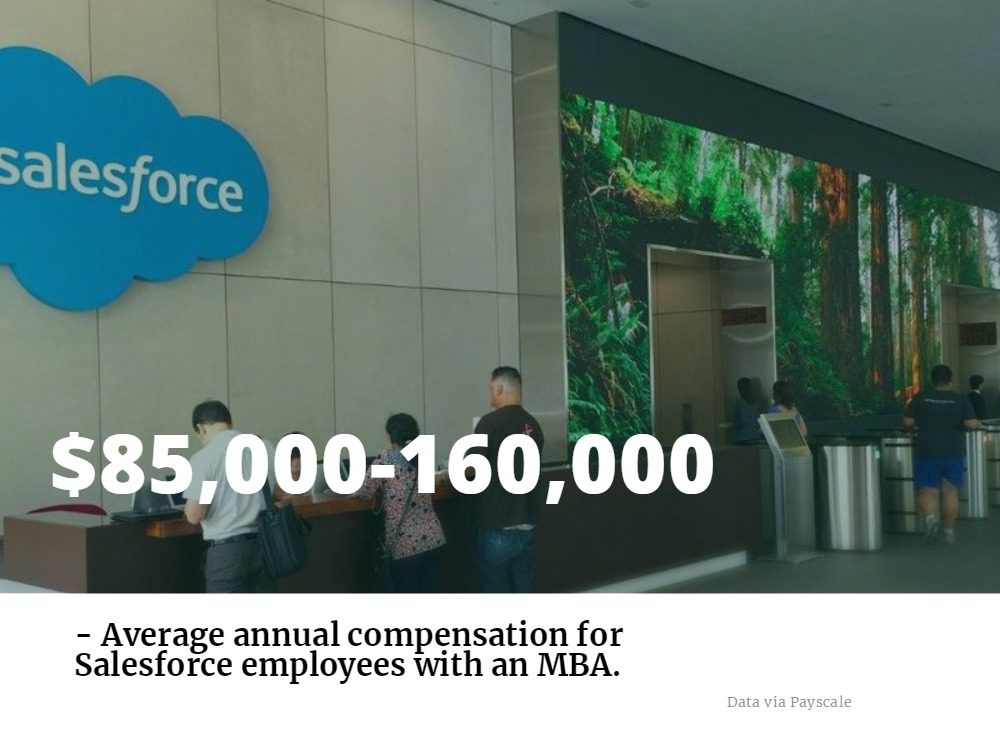

A recent FirmsConsulting.com article says it best regarding the need for good ICs:
“No matter how good a firm is, they can never predict all the problems with implementing a strategy.”
Among the skills required to become an effective Implementation Consultant are project management and general management, along with analytics. While many undergraduate degrees with a business or information systems focus can get your foot in the door, an MBA may push you to the top of the list of desirable hires.
An MBA with a consulting, project management, or analytics focus is ideal for a future in Implementation Consulting. As previous articles have covered, Chicago Booth, MIT Sloan, Columbia Business School, and Northwestern Kellogg, are all considered leaders of the pack of feeder schools to top consulting firms.
Project management education can also help earn a way into the role. Penn State’s Smeal College of Business‘ program is one of the top in the field, as are those at Lehigh University College of Business and Economics, Georgetown University McDonough School of Business, and Boston University’s Questrom School of Business.
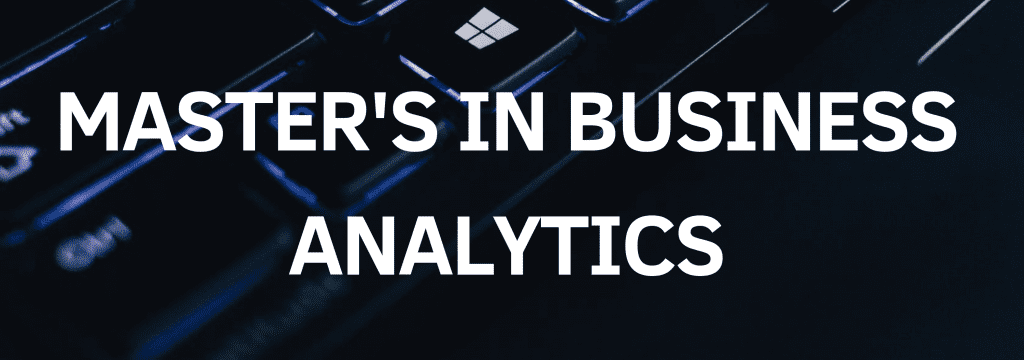

Welcome to MetroMBA’s Master’s in Business Analytics Guide. As the world’s best business schools continue to evolve, traditional MBA programs are being replaced or supplemented with specialized master’s degrees. For many schools, that means including a Master’s in Business Analytics program to provide graduate training specific to careers in financial analysis, statistics, and marketing.
Scroll down to find some of the world’s best Master’s in Business Analytics degrees offered by the world’s leading business schools: a list that continues to grow year by year. But first, what is a Master’s in Business Analytics, what does it take to graduate, and what career opportunities are available after graduation?
With the rise of big data, businesses are gathering more and more information. Analytics provide a way to understand and effectively put that data to use. Analysts use machine learning algorithms to process data to make conclusions. One of the best-known uses of analytics is Moneyball, the sabermetrics-based system used by many baseball teams since it was first introduced by the Oakland Athletics in 2002.
As analytics find its way into more fields, business analysts can be found across the business landscape, from sports to manufacturing to healthcare to consulting.
The goal of business analysts is to optimize efficiency for the organization, whether it is streamlining the production line or creating a new social media strategy, analytics is making sense of the great amount of data gathered daily in the business world.
In all business analytics programs, students will take courses on the following topics:
As business analytics graduates inch closer to the professional world, the business- and finance-related courses that come packaged with their programs will help prepare them for their future careers.
The length of the program depends on how one decides to get a Master’s in Business Analytics. The best way for those interested may be through business analytics. The majority of business schools offer business analytics programs that can be completed in 10 to 12 months. In addition, many of these programs are STEM-designated, providing international students with an extra 24 months of optional practical training, providing a total of 36 months.
These programs teach the skills discussed previously and are tailored to prepare students for future careers as business leaders. For example, Duke University’s Fuqua School of Business offers four separate professional tracks—finance, marketing, strategy, and forensics.
There are other programs that offer MBAs with concentrations in business analytics. For example, The Wharton School at the University of Pennsylvania allows students to major in business analytics. Since analytics is only a component of the general program, Wharton students interested in business analytics must complete the two-year MBA program.
Students can complete the program either in person through full-time, part-time, online, or hybrid tracks. The options vary from institution to institution so you will need to decide what is best for you and your career plans.
As one might expect, it depends on where you complete your program. If you attend a public university, expect to spend more than $60,000 in tuition and fees for the program. This total could be less if you are a resident of the state. If attending a private school, expect to spend around $75,000 in tuition and fees. Neither of these amounts include living expenses such as housing, health care, and transportation.
There are many opportunities available in the business sphere for analysts. Most positions have the following names: business analyst, budget analyst, financial analyst, corporate strategy analyst, actuary, social media data analyst, business intelligence analyst, and machine learning analyst. According to the Bureau of Labor Statistics, the median salary for a financial analyst with a master’s degree is $85,660. Experience can increase this amount.



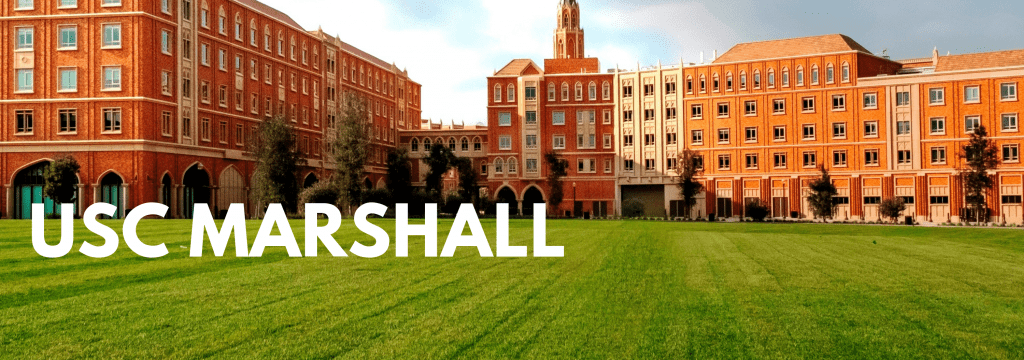












A career in real estate is not a common choice for MBA graduates. In fact, a relatively small number of MBA students pursue careers in real estate, but that makes choosing the right business school all the more critical.
Real estate is a highly specialized field, so it’s essential that MBA students have access to the appropriate certifications, majors, centers, professors, and courses. If you’re interested in a career selling, buying, managing, developing, or speculating in real estate, you need to head to a premier MBA program that will help guide you and make the connections required to fuel your success.
For busy career professionals who can’t afford to take time off of work or who travel or live away from a world-class university, an Online MBA program is a viable option. The latest programs offer incredible flexibility, rigorous curriculum, and a very comparable experience to an in-person MBA.
So, it should be no surprise that the online MBA is growing in popularity exponentially.
To better understand the landscape of the online MBA and to follow up on our first piece, The Online MBA: Which Programs Matter?, we reached back out to USC Marshall, UNC Kenan-Flagler, Michigan Ross, Indiana Kelley, and CMU Tepper. They allowed us to pick their collective brains even further to unravel the mystery around the online MBA.
Just a few years ago, it seems, earning an MBA online was not considered a valid option. After all, what employer would take an online MBA seriously? It was only for those students who wanted an “easy” degree and didn’t want to go through the effort of a “real” full-time MBA program.
In 2011 when UNC Kenan-Flagler launched their online MBA program with 19 students, The Wall Street Journal wrote, “UNC Makes Risky Online Bet.” But times have changed, and so has the landscape of the MBA. While the full-time MBA isn’t going anywhere anytime soon, it does have some solid competition.
“Today that so-called ‘risky bet’ has yielded almost 2,000 graduates who are thriving in their careers and deeply connected to the UNC Kenan-Flagler community,” explains Kenan-Flagler Dean Douglas A. Shackelford.
An online MBA is not only a respectable choice, but a sought after choice. It’s all due to a better understanding of what an online MBA is and the perceptions of the quality and power of an online MBA.
“Online MBAs have certainly become a more viable option for students as the technology evolves and students see that they can get the same quality education remotely as they can on-campus,” explains Cindy McCauley, Executive Director of Online Masters Programs at CMU Tepper. “You no longer have to trade off learning from top faculty, or building a strong network, when you choose an online MBA program.” You get it all.


The surging economy has had a major impact on the growth of the online MBA. More so than ever before, professionals are reluctant to step out of work to complete a full-time MBA program.
There’s a segment of the business community—particularly mid-career and late-career professionals—who don’t want to put their career on hold for school, but they still want the benefits. These individuals need a convenient alternative that allows them to earn their MBA while still working. That’s where the online MBA comes into play.
According to Patti Russo, the Managing Director of Part-Time MBA programs at Michigan Ross, online MBA programs offer two distinct features:
“In terms of access, online programs extend a school’s reach to students who want to pursue a top-tier MBA program, but are not located geographically close to a school,” explains Russo. “The online program also makes earning an MBA really flexible by giving working professionals the opportunity to stay at their jobs while obtaining a world-class business education.”
According to Ramesh Venkataraman, Chair of the IU Kelley Direct Online MBA & MS Programs, this flexibility especially comes in handy for professionals who have recently received a promotion or accepted a new position. Representing around two-thirds of the IU Kelley MBA class, these students cannot afford to spend time on campus, considering they don’t know where they’ll be at any given time.
“We also enroll a large population of active duty members of the military and working professionals who travel often for work, and who need the ability to complete coursework while living or working abroad,” says Venkataraman.
For example, one UNC Kenan-Flagler student attended class from five continents thanks to his busy work schedule, but he never had to stop his education. An online MBA program means that you can attend class from wherever you are as long as you have a computer and Internet access.
“The online MBA is available to anyone, regardless of where they live,” explains CMU Tepper’s McCauley. “And it offers the same rigorous, analytics-based curriculum as the full-time program.”


The third crucial feature of online MBA programs is their ability to prepare students for the digital business world. As Russo says, “The business world is becoming increasingly more digital with individuals working virtually with others spread across the globe, and online curriculum will prepare students to succeed in this new environment.”
This thought is echoed by USC Marshall’s Vice Dean for Online Learning Programs, Sandra Chrystal. She explains that it was USC Marshall’s recognition of how global corporations rely on virtual teams and training to conduct business that sparked the creation of their online MBA.
“USC Marshall prides itself on innovation and continuous improvement,” says Vice Dean Chrystal. “We created a 21st-century multi-disciplinary integrated curriculum designed for a virtual platform, which mirrors business practices. Management communication and business analytics are components of all of the courses, and virtual team building begins immediately.”
The online MBA is also more competitive than ever before, which means the product offerings are better, according to IU Kelley’s Venkataraman.
“The increase in high-profile, credible organizations releasing rankings for online MBA programs have brought more attention and credibility to the online MBA space and, therefore, more interest in it by prospective students,” says Venkataraman.
A decade ago, few high profile top business schools offered an online MBA. Now, these same schools that were once reluctant to enter the online space are offering rigorous MBA programs, flooding the marketplace with exceptional curriculum, faculty, and opportunities.
And that change is being reflected in the rankings. Now, U.S. News & World Report, Princeton Review, and The Financial Times all release online MBA rankings. Students no longer have to choose between a well-ranked MBA and an online program—they can have both.
The students are also more high profile. An online MBA provides students with access to classmates who live and work around the globe and in a range of industries. This means that students can connect with a wider variety of individuals, building an expansive network.
“Comparing the class profile of the online and on-campus programs is like comparing apples and oranges,” Kenan-Flagler Dean Shackleford says. “GMAT and GPA scores have little relevancy for evaluating them. They’ve been out of school for a long time and have significant work experience; what matters now is what they have achieved in those years—their career growth.”
Last, but certainly not least, is the change in how students perceive the online MBA. Applicants nowadays are used to technology and the increasingly digital world, so they’re not afraid of using technology for their education. In fact, they expect it.
“Students today are comfortable with online learning,” says UNC Dean Shackelford. “Even if they’re not digital natives, working professionals are accustomed to collaborating with remote workers and teams as part of their jobs.”
As for those students who aren’t as comfortable in an online environment and digital learning, an online MBA is a perfect opportunity to change that.
“Students will learn teamwork and leadership skills in a virtual environment,” said Michigan Ross’ Russo. “They will have to work remotely with their classmates on the course material and group projects, including our signature action-based learning experience MAP, which pairs student teams with global companies and organizations to tackle those entities’ greatest challenges.”
So, where is the online MBA headed? What can applicants expect in the future? We asked USC Marshall, UNC Kenan-Flagler, Michigan Ross, Indiana Kelley, and CMU Tepper: “What is the long-term vision for your Online MBA?”
Here’s what they had to say:


Sandra Chrystal
“Although our Online MBA will continue to increase its diverse demographics, cohorts will not exceed fifty students. The number of cohorts may increase, however, and growth will be prudent. Since Marshall faculty teach all of these classes and Marshall instructional designers and production media teams create the asynchronous materials, the online MBA will consistently seek quality learning over larger enrollments.”
–Sandra Chrystal, Vice Dean for Online Learning
“From the very start, our vision has been that the MBA@UNC is the same MBA program offered in a different format. We built the online MBA with the concept of no compromise: offering our MBA in a new format with the same quality (students, faculty, curriculum) and experience (deep engagement among our students and their professors to build lifelong relationships and networks) as our on-campus programs.
Now we are advancing that vision. First, we integrated all of our MBA programs’ operations, and now we are changing our processes so students can take courses in any MBA format we offer. We are blurring the lines of program format to meet the needs of students.
Our model is blended. You watch lectures recorded in high-quality format and meet for discussion in live classes on our platform where you see and interact with a small group of classmates and your professor. You also study together in person at our Global Summits—two in the U.S. and two in other countries every year. These small class sessions, group projects, and in-person summits are among the ways we ensure the UNC Kenan-Flagler culture is integral to our students’ experiences.”
—Douglas Shackelford, Dean, UNC Kenan-Flagler


Patti Russo
“Our first Online MBA class is shaping up to be a group of highly diverse, very talented, and accomplished professionals. We are confident that future cohorts will be as well. In addition, the majority of students who attend Michigan Ross credit the program for widening not only their career prospects, but also expanding their worldview.
Our online students will join the Michigan Ross community, connecting them to a powerful global alumni network and tuition-free Ross executive education open enrollment courses for life.”
—Patti Russo, Managing Director, Part-Time MBA Programs
“The long-term vision for the Kelley Direct Online MBA is to continue offering a high quality, engaging, and rewarding student experience to students across the globe who are looking to progress in their careers and make a positive impact on their organizations and communities. We are pleased with the quality of candidates who have chosen Kelley Direct and will continue to seek out current and future leaders from a variety of industries to add to our powerful network of Kelley alumni.”
—Ramesh Venkataraman, Chair, Kelley Direct MBA & MS Programs


Cindy McCauley
“We want our Online MBA program to provide the best educational experience and career outcomes for our students. We maintain a small class size to ensure that all classes are taught by our own faculty who teach in the full-time program and are not willing to trade quality for scale.
In our program, every class starts with in-person classes, so students can meet their faculty and connect with colleagues. Following these classes, students meet online in a format that allows faculty to see everyone in the class, and for students to interact as if they are in a classroom.”
—Cindy McCauley, Executive Director, Online Masters Programs


Welcome to MetroMBA’s Master’s in Finance Guide. As the world’s best business schools continue to evolve, traditional MBA programs are being replaced or supplemented with specialized master’s degrees. For many schools, that means including a Master’s in Finance program to provide graduate training specific to careers in corporate finance, investment management, and financial analysis.
Scroll down to find some of the world’s best Master’s in Finance degrees offered by the world’s leading business schools: a list that continues to grow year by year. But first, what is a Master’s in Finance, what does it take to graduate, and what career opportunities are available after graduation?
A Master’s in Finance (MFin) degree is hyper-focused on finance, covering a comprehensive range of topics within the field. It’s designed for early-career professionals and recent undergraduates hoping to ensure a future in the finance industry. Previous work experience is often not required, meaning that many applicants tend to be younger.
The degree dives into both fundamental and advanced subjects in finance, including finance theory, financial mathematics, financial accounting, financial modeling, pricing theory, and computational methods. The goal is to help students tackle the multi-faceted challenges that they’ll face in the field of finance.
Students should graduate being able to handle everything from capital budgeting to cash flow analysis, dynamic asset allocation, and big data-based investment strategies. They should also be well versed in finance ethics and social responsibility, which they’ll draw from throughout their career.
Another dimension of the Master’s in Finance degree is computational methods. Depending on the program, students might find that their degree requirements include basic programming skills in R or Python for processing and analyzing data. Finally, action learning, workshopping, and internships can play a key role in the MFin, providing students with hands-on experience in finance.
Some Master’s in Finance programs begin with core business courses covering economics and other critical business topics. Other programs jump right into financial markets, corporate finance, and finance theory. It depends on the program, but no matter what, the vast majority of the curriculum will emphasize finance.
Some typical Master’s in Finance classes include:
Beyond that, depending on the program, you may have the option to customize your coursework to a more specific area of finance. For example, you could take courses in entrepreneurial finance or healthcare finance. Other options include:
Most Master’s in Finance programs tend to be shorter, requiring just 12 months to complete all requirements. Others are slightly longer in length- up to 18 months-but few, if any, reach the two-year mark. Programs can be full-time or part-time, residential or online, it all depends on the exact program you choose. No matter the case, it’s typically an intensive and fast-paced program with a busy schedule.
Admissions into a MFin program can vary based on the business school, but typically requires a high level of excellence in grades, test scores, professional experience, and communication.
Applications may consist of:
At minimum, applicants are expected to be familiar with mathematics and business basics prior to beginning their MFin program. Common undergraduate majors include: Math and Science; Business & Commerce; Economics; Engineering; and Computer Science. A solid understanding of economics, finance, and computer science is beneficial.
Tuition varies greatly among top business schools. It ranges from $50,000 to $85,000 USD for a year, plus living expenses. In many cases, funding is available for MFin students in the form of scholarships, fellowships, employer sponsorship, and teaching assistantships. There are also loans and external financial support sources available.
Master’s in Finance graduates work in finance in some way, in positions that usually require financial training beyond basic business degrees. Most often, graduates will work in investments, trading, or risk management at an investment bank, commercial banks, accounting firms, hedge fund, venture capitalist, insurance company, public institution, fintech, or consulting company.
Whether working at a Fortune 500 company or a leading-edge boutique, MFin graduates are highly sought-after employees. Potential employers include:
One thing to note is that Master’s in Finance students typically earn less than MBA graduates, since they tend to have less work experience under their belts and a narrower range of skills. Projected salaries vary based on the exact career field with the highest paid earning $150,000 while some of the lowest paid earn $57,000.
Here’s how the salaries break down in terms of annual median salary (USD):
















The length of California is approximately 770 miles. From top to bottom, visitors will find a mass of fascinating contradictions—Silicon Valley, Napa, Hollywood Glitz, Malibu, the SF Mission, Humboldt County pot farms, Yosemite,
San Diego surf, Fresno farmland, Palm Desert, the rolling hills of John Steinbeck Country.
These are just a handful of examples that represent the wonderful diversity of landscapes and communities all technically located in one U.S. state. It seems abundantly clear why so many MBA graduates look to the Golden State to make careers for themselves.
This week, we highlight four California Job openings available for MBA graduates:
T. Rowe Price Group, founded in 1937 by Thomas Rowe Price Jr., is a leading global asset management firm offering services to individual clients as well as institutions and financial intermediaries.
Headquartered in Baltimore with offices in 47 countries, recent MBA graduates with an eye toward investment would do well to consider a career at T. Rowe Price.
T. Rowe Price’s commitment to responsible corporate stewardship and social engagement with their immediate communities has earned them respect from a lot of its peer companies. Its been recognized by Fortune World as one of the world’s Most Admired Companies in Securities and Asset Management, and one of Forbes America’s 50 Most Trustworthy Financial Companies.
Salaries for MBA grads can greatly vary at the firm. According to PayScale data, senior business analysts earn an average annual salary of $88,524, with max compensation as high as $120,000. Financial consultants—a position more readily available for entry-level employees—earn an average annual salary of $62,792. Overall, SimplyHired data indicates that MBA grads can expect to make around $67,471 per year, with the top 25 percent of earners making over $100,000.
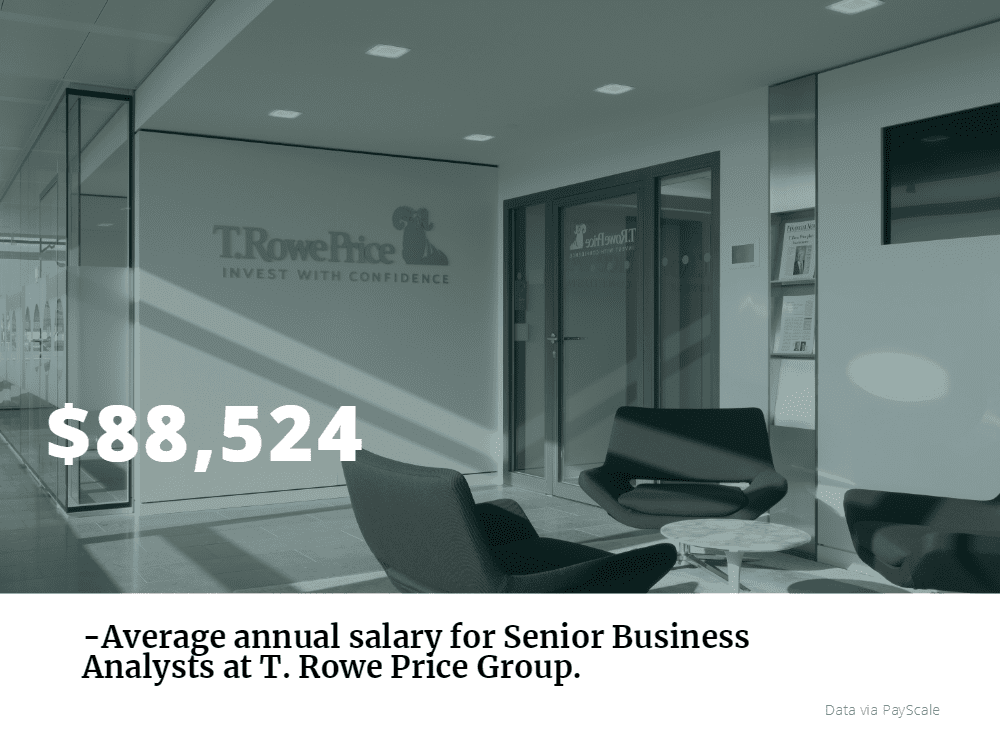

Additionally, T. Rowe Price offers both short-term and long-term benefits for its employees. In the short-term, it offers valuable tuition assistance to employees completing a degree program. In the long-term, it offers retirement plans, investment plans that includes matching contributions, and life insurance plans. It stresses the importance of a healthy work/life balance, reinforced by benefits like extensive health care coverage, family support for working parents, various wellness initiatives, and passes for local recreational attractions. T. Rowe Price also offers PTO and matching donation programs through their Workplace Giving Program, boasting more than 40,000 hours volunteered by associates in 2018 and $11 million dollars donated by associates in 2017 through the program.
T. Rowe Price has earned a reputation for their ability to facilitate workplace morale. In 2017, Forbes named it one of the best mid-sized firms in the U.S. for its ability to keep employees feeling satisfied and well-compensated. Pensions & Investments named it one of the “Top 50 Best Places to Work in Money Management“—a distinction it was also awarded in 2015.
An important component of these achievements is T. Rowe Price’s work with respect to office diversity. In 2016, the Anita Borg Institute named it one of the Top Companies for Women Technologists, boasting 44 percent women in its total global workforce. In 2019, it was named one of the “Best Places to Work for LGBTQ Equality” by the Human Rights Campaign. T. Rowe Price also seeks to improve their diversity through initiatives like WAVE, which facilitates the development of talented women; PRIDE, which focuses on the LGBTQ+ community; and MOSAIC, focused on building ethnic diversity.
Associate positions at T. Rowe Price require the following from a prospective employee:
Additionally, T. Rowe Price has a few important preferred qualifications. Of course, high on the list is either the completion of an MBA program—or progress toward the MBA degree.
As mentioned above, the company sometimes offers tuition assistance for employees who are in the process of completing a graduate program. Another attribute that will help you stand out is experience the field, especially in the given area that the position for which you are applying.
For applicants with at least eight years working experience in financial services, corporate strategy, and/or management consulting, this might be a promising job opportunity. A CFA or MBA will also give you a leg up on the competition. This job focuses on big picture investment strategies and presents these ideas to employees and stakeholders.
For applicants with financial analysis chops, this position might be ideal. In this position, one would assist a team of portfolio specialists to create strategies for investment. This is also ideal for those in the process of completing their MBA or CFA.
The Grand Canyon State offers two attractive MBA programs tailored to professionals looking to expand their career horizons.
Arizona State University in Tempe, just outside of Phoenix, and the University of Arizona in Tucson, 60 miles from the Mexican border, are both large public universities with renowned business schools. Each program has unique strengths depending on what prospective b-schoolers are ultimately hoping to get out of their business school experience.
We take a look at the two largest business schools in the state of Arizona in our most recent School v. School comparison, analyzing Arizona vs Arizona State.
The Johns Hopkins University Carey Business School recently honored Associate Professor Michael Darden with a Catalyst Award in acknowledgement of his early career accomplishments.
The awards were first introduced at Carey in 2015 to support the efforts of professors like Darden who have shown originality and impact in their fields. Darden, whose work focuses on the economics health care markets and tobacco regulation, will receive a $75,000 research grant. He formerly taught health policy and management at George Washington University and economics at Tulane.
Darden received his Ph.D. in economics from the University of North Carolina. He is currently a research faculty fellow at the National Bureau of Economic Research.


Carey Business School Associate Professor Michael Darden, winner of this year’s Catalyst Award \ Photo via carey.jhu.edu
On the news of the award, Johns Hopkins University President Ronald J. Daniels says, “There is no more urgent time than the present to renew our commitment to those whose ideas will improve the condition of our world and its people… By supporting the creative and ambitious research of early-career faculty, we are investing not only in the future of these exceptional scholars but of the entire academic enterprise.”
For more on the Catalyst Award and Michael Darden, read here.
The Penn State Smeal College of Business recently hosted a panel of some of the country’s leading experts in infrastructure and transportation. Members of the panel, convening in New York City, discussed some of the critical issues facing the country today.
David Welsh, Penn State Smeal alum and founder of Normandy Real Estate Partners, led the discussion. The panel included Sarah Feinberg, Metropolitan Transportation Authority (MTA) board member and former U.S. Department of Transportation chief of staff; Anthony Coscia, chairman of Amtrak; Parick Foye, chairman of the MTA and Steve Plate, chief of major capital projects of the Port Authority of New York & New Jersey.
Larry Silverstein, chairman of Silverstein Properties and developer of the new World Trade Center in New York City, co-hosted the event. “Our experience here at the World Trade Center showed us how important it is for government to work hand in hand with the private sector on large infrastructure projects. We can’t do them alone; we have to work together,” he says. “Our country’s transportation infrastructure is the lifeblood of our economy and society.”
The event was organized by Penn State Smeal’s Institute for Real Estate Studies (IRES), a privately sponsored research institute within the University.
Three teams of students in OSU Fisher‘s Global Applied Projects program partnered with OSU’s Global Water Institute (GWI) and Global One Health Initiative (GOHi) to help create strategies for clean water initiatives in Kenya and Tanzania. Using a franchise model, the student teams analyzed the ways in which the clean water solutions could be profitable.


Ohio State Fisher students, working with OSU’s Global Water Institute (GWI) and Global One Health Initiative (GOHi) / Photo via fisher.osu.edu
Erin Collin, a second-year MBA student and graduate assistant at the GWI says, “Our goal was to help address these issues by developing a franchise offering that could be used to specifically address the challenges outlined above by adding more structure, resources and accountability.”
The students’ input will remain valuable as the GWI develops strategies for franchising, along with partnerships with local East African governments and universities, the World Bank, and clean water advocacy organization WaterAid. The teams who worked with the Global One Health Initiative had the goal of developing clean water infrastructure in Ethiopia. Students traveled to the region to connect with residents, conduct interviews, and visit sites.
“GAP was absolutely a highlight of my MBA experience because it provided me an opportunity to bring together so many of my passions: international development, public health, strategic and analytical thinking, teamwork and international travel,” says Courtney Clark, a second year MBA. “Writing our final report felt like the most meaningful thing I have done so far in the MBA program.” Read more on the GAP and its international partnerships here.
Vanderbilt University’s Owen Graduate School of Management has announced a new director for its innovation workspace, the Wond’ry.
David A. Owens is a Professor for the Practice of Management and Innovation at Owen, but his expertise stretches across disciplines. He is faculty director for the Vanderbilt Accelerator-Summer Business Institute, in addition to professor in the School of Engineering. Owens also holds appointments in the Peabody College of Education and Human Development as professor of the practice of teaching and learning, and the School of Medicine as an Associate Professor of Radiology and Radiological Sciences.
“My goal is to help students, faculty and staff to be more effective innovators by making it easier to find tools, mentors, expertise and insights on innovation practice and design research. We will also increase the Wond’ry’s connections to Vanderbilt’s research centers,” says Owens of his appointment.
Owens has lent his product development expertise to a diverse group of organizations such as NASA, Nissan, Wrigley’s, LEGO, and Gibson Music. He has also served as CEO of Griffin Technology and as a product developer for IDEO.
Boston University Questrom School of Business recently hosted academic journal Management Science’s 65th Anniversary Conference, where Dean Susan Fournier headlined with a presentation on brand management.
In her talk, entitled “Taking Brand Seriously in the Age of Risky Business,” Dean Fournier discussed the ways in which brands can survive in an increasingly competitive landscape. Using such examples as PepsiCo’s failed ad campaign featuring Kendall Jenner in a protest scene, Fournier made various points on the success and failure of companies’ branding efforts.


Dean Susan Fournier’s presentation, “Taking Brand Seriously in the Age of Risky Business,” looked at the risks in advertising, including Pepsi’s advertising debacle, featuring Kendall Jenner.
Fournier, along with her leadership at Questrom, is also founder, president, and chair of The Institute for Brands & Brand Relationships, an international non-profit which promotes brand research and publications on the topic.
For more on the Management Science event and on Dean Fournier, click here.
While preparing for business school means connecting with future classmates, figuring out coursework, and brushing up on your writing and quant skills, other necessities—like what kind of computer you’ll need—can be overlooked. That’s why we’ve rounded up recommendations from leading MBA programs and highlighted which laptops you should consider.
For the desktop faithful, a powerful computer may be well-suited to take on the MBA curriculum. However, considering the majority of students’ traveling demands, in addition to the ease and comfort of bringing a laptop to class, a portable device is likely a better alternative.
The question of having the right kind of business school laptop often comes down to simple prioritization, with cost usually at the top of most consumers’ concerns. But before you start roaming for discount deals, making sure your laptop has the right specifications is key.
Business schools, such UCLA Anderson School of Management, offer prospective MBAs a guide to what kind of computer they’ll need for the program, detailed below:


UCLA Anderson’s computer recommendations for its MBA students.
The majority of business schools, including the Northwestern University Kellogg School of Management and the MIT Sloan School of Management, suggest the same technical standards.
Most of the technical specifications listed above are fairly standard for laptops produced within the past several years, so finding a product that hits the minimum requirements is fairly simple. For example, Intel, the primary manufacturer of computer processing units, released its 6th generation Core processors in 2015, succeeding its 5th generation models. The only concern prospective MBA students may have are with computers that have an Intel Core M processor, which are below the suggested standards. Laptops with these processors, however, are often the most base-level on the market, and are typically only found in very inexpensive models. Intel has not released a new M processor since 2018.
Major companies like Dell, Lenovo, and Apple have all or most of the suggested specifications, such as webcam interface, integrated graphics cards, and 802.11 wireless connectivity, included standard in newer models. However, even when looking for a brand new laptop, one major element to take note of is the power of the hard drive. Even devices that would be considered in the mid-to-upper price tier, such as the Apple Macbook Pro and Dell XPS, do not come standard with a 256 GB SSD (solid state drive). Rather, the base-level models are usually paired with a 128 GB SSD, and there is a distinct price difference in comparison to 256 GB SSD models. Of course, for the handy few, installing your own SSD card into the computer is possible, and can mitigate much of the cost differential. But for most students, opting for a model with 256 SSD standard will be the most reasonable route.


Be wary: even costly base level models, like the Microsoft Surface, do not come standard with a suggested 256 GB SSD.
While many prospective students won’t belabor the technical differences between certain laptops, the necessary software can often be more important. Columbia Business School‘s own “Choosing a Laptop” guidelines informs prospective MBA students that the software needed for the curriculum is based around the Windows operating system. Which means Apple users may be at a disadvantage, even if their laptops are fitted with Windows OS. In fact, the school recommends avoiding Apple altogether:
“If you intend to purchase a new laptop for your studies at CBS, the School highly recommends that you purchase a computer that already runs Windows natively (not a Mac). Many students who have chosen to purchase a Mac prior to CBS have later regretted the choice because they ended up using Windows more than anticipated, and Windows virtualized in a Mac never performs as well as if it were ran natively (e.g., the OS is slower and more prone to glitches, and there is a learning curve for the keyboard, etc.). For these reasons, we recommend that anyone who has to purchase a new laptop to meet the School’s minimum computing requirements selects a native Windows machine.”
For those hoping to attend CBS that already have an Apple laptop, the business school will provide students Windows OS free of charge. The only requirement, however, is at least 50 GB of free memory (Windows OS requires 35 GB).


Even if all the hardware specifications are met, Macbook users may be at disadvantage in MBA programs. Many institutions, such as Columbia Business School, require software tools only found in the Windows Operating System.
MBA prospects that are in the market for a new laptop may be wise to focus attention on affordability. After all, with the cost of education, saving money anywhere you can is a plus. However, this decision comes with an obvious degree of consideration. Laptops under the $500 USD threshold often do not have the necessary hardware to handle an MBA curriculum. But for those who only need a device to get by, several models can do the trick with minimal cost, such as the Lenovo IdeaPad 330.


MBAs with affordability in mind should consider the Lenovo Ideapad 330.
The 14″ Lenovo Ideapad 330 base model starts at a modest $536.79 and comes with an 8th Generation Intel Core i7-8550U processor, Windows 10 OS, and 8 GB of memory, to start. The model can be upgraded with a 256 GB SSD, but cost-savvy buyers would do well to check out Newegg.com, which offers several 330 Ideapad models with 256 GB SSD for under $500.
For those wary about performance but still with cost in mind, the Acer Aspire E 15 might be a better alternative. Laptop Mag rates the Aspire E 15 among the best affordable laptops available, with a direct, succinct review:
“Every once in a while, a laptop comes along that defies its low price. Yet again, the Acer Aspire E 15 is one of those laptops. Punching well above its weight class, the 15-inch machine has a sharp 1080p display, good performance and a wide variety of ports. The laptop’s keyboard is comfortable, its battery life is decent and it stays cool under a heavy workload. Despite a few notable shortcomings—a poor webcam, bulky design and unwelcome bloatware—the Aspire E 15 offers excellent bang for your buck, which is why it’s our best overall sub-$500 laptop and a very good choice for students.”
PC World also highly-recommends the Aspire E 15, rating it as the “Best Laptop Under $500.” And like the Ideapad 330, several Aspire E 15 models can be found over at Newegg for under $500.
MBA aspirants with major career aspirations likely aren’t going to dwell too much on the price of a laptop alone. After all, for those thinking long term, a modestly expensive model will likely be a better investment. For those looking for a bit higher performance, it’s hard to go wrong with the Dell XPS 13.


For the best blend of hardware, design, accessibility, and price, the Dell XPS 13 has stood out for years.
Tech-savvy readers have likely heard this before. Outlets such as PC Mag, Laptop Mag, CNet, and Engadget have been showering Dell with praise since the introduction of the XPS line in 2012, which was the first official Dell “ultrabook.” In fact, it is currently the only model rated by PC Mag with a perfect score.
The company’s flagship 13.3″ laptop comes standard with an 8th generation Intel-i3 core processor, 4 GB of memory, and a UHD Graphics 620 card. However, for the 256 GB SSD and 8-16 GB of memory models, the price increases from a modest $899 to, at least, $1,079.99. Upgraded versions with touch-screen capability and a larger screen are available, but all of the requirements needed for a typical MBA program are met by the $1,079.99 model, which features 8 GB of memory, 256 GB SSD, and an 8th generation Intel-i5 processor.
Your laptop likely isn’t going to just be for school. From major projects, to personal entertainment, and even gaming, your laptop will likely be your personal hub for many years to come. Virtually every laptop in the upper-cost echelon, ranging from $1,300 and up, fits the hardware requirements needed for an MBA program and then some.
For those already possessing a degree of business experience, the sight of a Lenovo ThinkPad X1 Carbon may be a bit familiar. A typical favorite of business professionals, Laptop Mag refers to the ThinkPad X1 Carbon as the “Maserati of business laptops” in its most recent review, with the 6th generation model boasting a beautiful Intel Kaby Lake-R CPU, and even an optional 2K HDR display. And unlike many of the aforementioned models, the ThinkPad X1 Carbon is built with an extremely sturdy frame, despite only weighing 2.49 lbs. For $1,367.10, it includes a standard 256 GB SSD, an 8th generation Intel-i7 processor, and 8 GB of memory—all of which can be upgraded.


The Lenovo ThinkPad Carbon X1 (6th gen), dubbed the “Maserati of business laptops,” is built perfectly for any MBA candidate.
Major online distribution outlet Newegg is a favorite among the tech-savvy and often sports some of the best PC deals you’ll ever find. However, like Amazon, most of the laptop models you’ll find at steep discounts are often among lower-end models (unless, of course, you’re comfortable buying a refurbished computer). In addition, sales are often frustratingly temporary. However, there are certain times of the year when laptops may be had at a modest discount, with the best deals usually happening in the summer.
According to The Nest, “the months of August and September present opportunities for laptop buyers to save money. The traditional back-to-school sale applies to laptops just like it does to other school supplies. A shopper will see advertised sales during the last month of summer vacation and the first month of the new school year. Some laptop sellers even run specials in July as a way of getting ahead of the back-to-school sales.”


MetroMBA has compiled crucial resources as you consider an Online MBA Programs that does not require the GMAT or GRE below:
Similar to how the SAT plays a role in undergraduate admission to higher education, the GMAT/GRE have been a consistent requirement for the majority of business programs globally. This standardized test has been one of a variety of factors that go into consideration when being accepted into programs. There are three main reasons that the GMAT/GRE has been part of the application process:
Based on surveys conducted by GMAC, the GMAT has been a reliable indicator of student success in the classroom among MBA programs. Many applicants also choose the GRE as an alternative to the GMAT due to its lower cost and unique scoring system.
The GMAT/GRE also provides a standardized scoring system, which is applicable to all students entering admissions to top MBA programs. Other factors such as years of work experience and undergraduate GPA are subjective and can vary depending on the applicant.
Major publication rankings such as the Financial Times, U.S. News & World Report, and Bloomberg take into consideration the average GMAT score for each MBA programs incoming class. For example, the mean GMAT and GRE score is weighted at 0.1625 percent for the U.S. News ranking. Historically, schools have an incentive to accept students with higher GMAT scored for ranking purposes in these major publication rankings.
There are many reasons to pursue an online MBA degree versus a full-time on-site MBA or a part-time on-site MBA:
The advancement in technology platforms, schools are increasingly able to provide an in-person atmosphere at remote locations for students. For example, many colleges utilize the web platform ClassroomLIVE, which is an integrated, web-based learning environment that delivers programs in real-time from classrooms on college campus’s direct to students, in their homes, at their workplaces, or while traveling. This provides a synchronous learning opportunity where students are able to interact live with professors and other students during the class as it is taking place on campus. Take a look at an example of the interactive learning platform here.
The stigma among corporate recruiters and hiring mangers when it came to online MBA job seekers was that it was not as respected compared to on-campus MBA offerings. However, with the online MBA becoming more popular among degree seekers, corporate recruiters and hiring managers are weighing the name of your college and the type of degree you have earned is more heavily than the method by which you earned your degree.
One of the major issues facing MBA degree seekers is balancing a career and family obligations while also being able to complete an MBA. Many part-time programs are offered at specific locations on specific days, creating a barrier for applicants to pursue the degree offering. One of the major advantages of pursuing an online MBA program is the flexibility the learning experience offers. Many programs are beginning to offer students the option to attend the classroom learning in person, but not penalizing them for accessing the curriculum remotely.
Since the overhead cost are lower for colleges and universities, online MBA programs are typically cheaper than on-site program offerings. This is another advantage for students who are looking to complete a flexible MBA degree at a lower cost. On average, online MBA programs cost about 15-20 percent less than an on-site offering.
For applicants who are looking to bypass the GMAT and pursue an MBA that does not require the GMAT, there still are requirements to be eligible for admissions to many online MBA programs, they include:
The professors and faculty in your MBA program are one of the most important facilitators as you learn the curriculum of an MBA. Professors have in-depth knowledge of business practices as they apply to the real world and the best ones can challenge you to apply the skills you learn throughout your MBA to real-life scenarios to prepare you as a business professional. It is important to understand your professors background and experience and how it will impact their teaching style and expertise.
Although professors and faculty will steer high-level learning, your classmates will have a large impact on your classroom discussions, projects, and case studies. Learning from experienced individuals will provide more value and insight throughout your MBA. It is important to prioritize the level of quality among your classmates to enhance your learning experience during your online MBA.
One of the most important assets an MBA program can provide is its inclusion to a wide range of alumni from CEO’s and CFO’s of Fortune 500 companies to presidents and general managers of global corporations. It is important as you consider the quality of the MBA program, that you also heavily factor in the alumni network that each institution provides to its newly dubbed alumni. These networks open doors to employment and internship opportunities post-graduation.
Many MBA programs offer internship opportunities during your educational experience. MBA internships allow you to get your foot in the door while directly applying the knowledge and skills you gained during your MBA. It is also important to research the career services office to see where previous MBA students have interned to make sure the opportunities fit your goals.





As you search for the best fit in an MBA program, the country’s big metropolitan areas are likely on your list. It’s clear that New York, Chicago, Los Angeles, San Francisco, Boston and Philly have no shortage of renowned business schools and robust job markets.
Newly minted MBAs can choose to take their careers in a variety of different directions after they graduate. A number of them go into the world of consulting, advising clients, and businesses on various issues. This week we will highlight a particular subset of consulting: strategic consulting.
Strategic consultants help businesses and clients prepare plans for future products, optimize their organization, and develop advertising campaigns, to name just a few tasks. If you enjoy planning, researching, and thinking three steps ahead, you should look at this week’s jobs.
Working in financial services is one of the most coveted career paths for MBA graduates. It pays well; you can find a job anywhere in the world; and top companies recruit in finance. Unfortunately, all that means that there is a lot of competition. It can be tough to break into the financial services industry though rewarding. If you’re interested in this lucrative career field, becoming a financial analyst might be the best place to start. Let’s take a look at what senior financial analysts do, how much they earn, who’s hiring, and where to earn your MBA. Continue reading…
The University of Michigan Stephen M. Ross School of Business offers part-time MBA students three optional formats: Weekend; Evenings; and Online. The major difference between all three formats is schedule, rather than the curriculum offered. Each program requires multiple on-campus residencies and completion of the Multidisciplinary Action Projects (MAP) course—a seven-week program that allows students to work side-by-side with a sponsor company. All three formats also offer online courses. However, the part-time Online program is more catered to students who wish to complete the program remotely.
Online students can complete the program with 57 credits.
The first year of the part-time MBA program at the University of Michigan Stephen M. Ross School of Business, regardless of format choice, consists mostly of core courses. The Online MBA features 27 credits worth of core courses, 18 credits of electives, nine credits of required on-campus residencies, and the three-credit Multidisciplinary Action Project.
A total of 55 students enrolled in the most recent Michigan Ross part-time evening cohort. About 18 percent of the class is female, with 29 percent U.S. minority students, and 24 percent international students. The average age of the class is 28, the GMAT average was 661, and GPA was 3.4.
The Weekend MBA cohort is fairly similar. The average age was also 28, the average GMAT is 656, and the GPA is 3.4. About 20.3 percent of the class are female students, with 19.5 percent international students, and 18.6 percent U.S. minority students.
The average work experience of students in both the Evening and Weekend MBA at Ross is 5.6 years.
The majority of Evening MBA graduates from the most recent cohort are employed in the manufacturing industry (41.1 percent), followed by technology (19.6 percent), and consulting (8.9 percent). Most Weekend MBA grads (44.9 percent) are also in manufacturing, followed by consulting (21.3 percent), and technology (12.4 percent).
The total tuition for in-state Michigan Ross Online MBA students is $112,731. For out-of-state students, the cost is $123,088. All tuition rates are subject to change every July. These costs do not factor in books, supplies, and other expenses.
Applicants can help fund their education through federal and private loans, although the type of loan offered may vary by student.
All application requirements for any of the Ross part-time MBA programs are as follows:
• A completed online application
• Official transcripts
• One professional recommendation
• GMAT/GRE scores
• A resume
• English language proficiency scores (if needed)
• Essay questions
• A non-refundable $200 application fee
Interviews may be conducted for select applicants by invite only.
Application deadlines are as follows:
Fall Early Application Deadline – March 28, 2022
Fall Final Application Deadline – May 16, 2022
Final Application Deadline – September 26, 2022
Where should you go to school in the Southeastern U.S.? There are many different options, so it depends on what you’re looking for. To make the best choice, you need to compare the cost of living of each city, the MBA programs available, the job opportunities, and the benefits of each area.
To help you out, our “Pick Your City” series breaks down two similar locations to help you make the best decision for you. In this article, we’re comparing Charlotte, NC and Atlanta, GA to see what each offers. Continue reading…